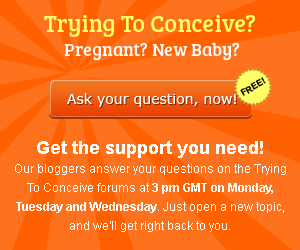Women who have been trying to conceive have plenty of reasons to regularly watch out for pregnancy signs and symptoms. While there is no doubt that a missed period followed by a positive pregnancy test are the most definite symptoms you are expecting, many signs can be felt even before a late menstruation.

Credit: Hans and Carolyn via Flickr Creative Commons.
Morning sickness, more accurately described as pregnancy nausea because it can strike at any time during the day, is one of the first symptoms many women experience. Some have an even earlier indication they are expecting – the so-called implantation bleeding where the uterine lining expels some blood when their embryo settles in. Almost every woman feels extremely fatigued during the first trimester. And many notice a definite abdominal bloating caused by hormones, more frequent urination, and mood swings. If you’re suddenly crying at the slightest thing, you might just have a baby!
And those who are already aware that they are pregnant may still have a lot of questions about their pregnancy and the pregnancy signs they are feeling. You may be worrying, and want to know whether what is going on with your body is normal. You might want to know if every expectant mother gets acne and looks like they are in High School again – and if there is anything you can do about this. Of course, you want to know when to expect fetal movement and how much weight you should be gaining.
It is important to understand that every woman is different, and every pregnancy is unique. Not every woman will have all possible symptoms of pregnancy, and only a small percentage will deal with complications such as gestational hypertension (high blood pressure) or diabetes. Pregnancy can be seen as a journey. Your destination is known (you are having a baby!), but you will not find out what the stops on your journey will be until you set out on it.
First trimester pregnancy signs
The first trimester represents a period of big changes for pregnant women. It is the trimester during which the most unpleasant pregnancy symptoms show up – but before people are aware that you are expecting a baby, they might not understand what you are going through. Fatigue and pregnancy nausea are perhaps the most difficult to deal with. Many women have such low energy that they would take afternoon naps if their schedule would allow it. Vomiting every day, or even several times a day, is annoying but totally normal. If you are vomiting so often that you are unable to keep down any fluids and foods at all, you should seek help, however.
While your body is working over hours at growing a human being from scratch and hormones are racing through your body, you might develop aversions to certain foods, drinks, and smells. It is also possible that you will lose your appetite and will not feel like eating much at all for a while. Trying to eat small meals that appeal to you more frequently can help with this, and also reduce pregnancy nausea.
Your breasts will likely be sore and tender, and you will notice an increase in the frequency of urination. These changes are largely caused by the hormone progesterone. Later on in pregnancy, you will need to take trips to the bathroom more often because your baby is pressing onto your bladder. In the first trimester, progesterone is the only culprit.
Some women lose some weight during the first trimester, while others will already start gaining weight in the first twelve weeks of pregnancy. Mood swings that are very similar to those many women (or should we say their friends and partner?) notice every month around the time of menstruation, are also typical during early pregnancy. Some become slightly aggressive, while others cry at the sight of puppies. Once again, you can blame your hormones for this pregnancy symptom! And don’t worry, because it will not last forever.
All of these symptoms may begin soon after you conceived, or some weeks after you became aware that you are expecting. The most obvious sign of pregnancy still remains a missed period. Some pregnancy tests are so sensitive that you can test up to a week before your menstruation is due, but all tests should be accurate on the day your menstrual period would normally be due.
Second trimester pregnancy signs
By the second trimester, your odds of having a miscarriage go down dramatically. Morning sickness and fatigue have probably gone or are at least less frequent, and you will develop a real baby bump. Perhaps the most exciting aspect of the second trimester of pregnancy is that you can expect to start feeling your baby kick! Most expectant moms will start to feel fetal movement around 16 weeks.
Women who are pregnant with their second baby or have already had multiple children before might feel fetal movement even earlier. If your placenta is anterior, and therefore attached to the front wall of your uterus near your abdomen, you might have to wait a while longer before you can feel your baby move.
Braxton Hicks contractions, an occasional painless tightening of the uterus, will also be more noticeable now. You will have had them since around eight weeks, but will start becoming aware of them about half-way through your pregnancy. During Braxton Hicks contractions, your tummy will suddenly feel very hard. They can last from a few seconds to several minutes, and often show up when you engage in strenuous physical exercise or after intercourse.
Other common second trimester symptoms include food cravings, skin changes (you might have that beautiful “pregnancy glow), and swollen ankles. Giving in to food cravings is fine, but you should also be careful to maintain a healthy and balanced diet. Staying properly hydrated will help you fight water retention, and putting your feet up while you can will also offer you some relief.
Was morning sickness your least favorite pregnancy symptom during the first trimester? It will probably have been replaced by frequent episodes of heartburn by now. Heartburn can be controlled by cutting out spicy and greasy foods, and many women find that dissolving a teaspoon or two of baking soda into a cup of water and drinking the mixture cures acute “attacks” of heartburn.
Your breasts have probably grown some by now, and are still tender. Some women already start leaking colostrum, your baby’s first milk, in the second trimester. It is possible you will have itchy nipples, and some will have raised bumps around their areola, the area immediately surrounding the nipple. These are called Montgomery’s Tubercules and while they may look odd, they are totally normal.
In addition, some women deal with blood pressure changes – either hypertension or hypotension – and lower back pain. These conditions all benefit from careful monitoring, which is why your healthcare provider will stay on the look-out for any signs of complications at each prenatal appointment.
Third trimester pregnancy signs
Towards the very end of your pregnancy, you will be looking for answers about which of your many pregnancy signs could be indications that your baby will be born soon. Is shortness of breath normal during pregnancy? Do your Braxton Hicks contractions indicate that your labor will be starting for real very soon? How do you know if your bag of waters has broken?
Expectant mothers in their third trimester might start feeling physically uncomfortable, and have sleepless nights because their big belly will not allow them to find any position that is comfortable. You might also have trouble tying shoe laces or putting on your socks! A whole-body maternity pillow could help you find the position that is most comfortable for you, or you can simply try using regular pillows.
Shortness of breath is not unusual and is caused by a combination of hormonal changes and the fact that your uterus is pressing down on your internal organs. Frequent bathroom runs were caused by hormones at the beginning of your pregnancy, but now there is no doubt that your baby is “guilty” of causing you to head for the toilet every five minutes!
If you have been experiencing the urge to iron everything in sight, or suddenly redecorate the nursery at two o’clock in the morning, you are not alone! The so-called nesting instinct is extremely common during the final weeks of pregnancy, and may in fact be one of the earliest signs that it won’t be long before you will deliver. Have fun scrubbing your floors five times in a row, or reorganizing your closets; just be careful that you don’t stand on a wobbly ladder with your third-trimester belly!
Late during the third trimester, your baby is likely to drop down lower into the pelvis. You will feel much better after that and will be able to breath more easily, and be more mobile. Signs of impending labor that you should watch out for during this time are losing your mucus plug, your bag of waters breaking, and contractions. The mucus plug looks like heavy, slimy vaginal discharge with blood in it. If you are wondering whether your water broke or you peed yourself (sorry, but that can happen in pregnancy!), do the smell test. Amniotic fluid is clear and does not smell of anything. Contractions speak for themselves. If your contractions are five minutes or less apart and last for longer than a minute, call your midwife or head for the hospital – it’s D-Day!

